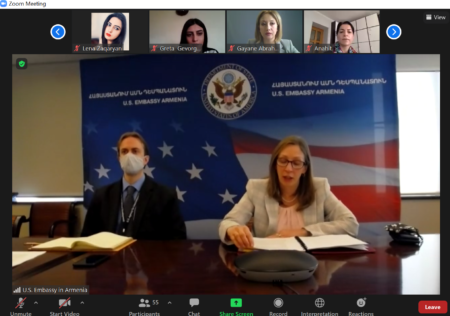On April 6, 2021, the Consortium for Elections and Political Process Strengthening (CEPPS), hosted a virtual roundtable event entitled, “Maximizing Women’s Political Participation in Armenia”. This event was held in anticipation of an amendment in Armenia’s National Assembly to increase the current gender quota for the electoral candidate list. This event intensified engagement and coordination on women’s participation in public affairs and encouraged a targeted and evidence-based approach to advocating for more women’s inclusion.

In Armenia, women comprise 52.2% of the population and, what may be surprising to some, 56% of them hold a degree in higher education. Despite this narrow majority and relatively high education rate, female representation in government and positions of power remains low. While a 25% quota system currently ensures that women are represented in political parties, they continue to face distinct barriers entering public office at all levels of government. Current statistics show that women only represent 2% of community heads, 10% of local council members (data from a 2019 UN report), 24% of National Assembly members, 8% of Government Ministers, 26% of Deputy Ministers; 18% of vice-governors. There are currently no female governors. CEPPS has found that in order to empower women, amplify their voices, and leverage their skills in policymaking, Armenians need to do a better job of integrating women in public affairs.
Amendments to the Electoral Code, endorsed by CEPPS partners at the National Democratic Institute (NDI) and the International Foundation for Electoral Systems (IFES), have been introduced in the Armenian National Assembly that would increase the gender quota that applies to all electoral candidate lists from 25% to 35%. On March 4, 2021, the Speaker of the National Assembly, Ararat Mirzoyan, requested an opinion of the Venice Commission and Organization for Security and Co-operation in Europe, Office for Democratic Institutions and Human Rights on the package of amendments, which is the most authoritative and influential body in Europe on issues of legislation and democratic institutions. However, it is not yet clear if any opinions will be received and integrated into the amendment package prior to the dissolvement of the National Assembly expected on June 20 during a snap election. For more context see the attached one-pager, prepared by the International Republican Institute (IRI) to promote policy recommendations based on the survey findings from a recently conducted poll in the country (Citation).
On April 6, 2021, CEPPS hosted the roundtable discussion, “Maximizing Women’s Political Participation in Armenia” online. To commemorate International Women’s Day on March 8, 2021, CEPPS partners from IRI and NDI, worked in close cooperation with OxYGen to host the discussion which highlighted a view shared by the majority of Armenians: more women are needed in politics. Data presented by IRI during the roundtable showed that 59% of Armenians believe it is important to have a balance of men and women in parliament. (Respondents varied in gender, age, and whether they resided in urban or rural communities.)
The discussion, which included an opening speech by United States Ambassador to Armenia Lynne M. Tracy, engaged a diverse group of participants in a discussion on the challenges and opportunities for women and political participation in Armenia, with recommendations and strategies on how to maximize their political engagement. The event was well-attended was well-attended by high-level representatives from the Armenian National Assembly, civil society organizations, and the diplomatic community in Armenia.
The roundtable event not only intensified engagement and coordination among local and international actors on the issue of increasing women’s political participation, it also helped ensure that future policies in the field are evidence-based and targeted. CEPPS’s data helped disprove assumptions that there is large polarization in the Armenian public surrounding women’s engagement in public affairs. CEPPS looks forward to using this data to formulate policy proposals for women’s inclusion in government, as well as to introduce gender-sensitive policy-making procedures at all levels of government.